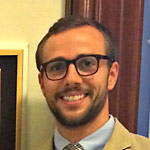Christopher Gambino is a Ph.D. Candidate pursuing, living, and teaching the knowledge of coupled systems like that of the Nitrogen Cycle. He is an NSPIRE IGERT (Integrative Graduate Education and Research Traineeship) Fellow at Washington State University. He is classically trained in bioenergetics and now works at the intersection between food, agriculture, and environmental policy.
Christopher Gambino loves science. But, for him, science is not merely something that happens within the confines of a laboratory; it is a vital tool for addressing pressing problems.
Gambino is a doctoral candidate at Washington State University studying the climate impacts of our food system, particularly the cycling of carbon and nitrogen in beef production. Although he’s a specialist in animal science and nutrition, and the nitrogen cycle, his true passion is to apply his technical expertise to vital policy issues at intersection between food, agriculture, and environmental policy.
“We fail our experts by not providing them better communication tools as they go through their [degree] programs,” Gambino says. “There’s a huge amount of technical knowledge involved in science. But science also impacts our everyday life. And it is vital to our ability to make good decisions.”
Gambino says that a key for him in his career as a scientist so far has been his involvement in the National Science Foundation’s Integrative Graduate Education and Research Traineeship (IGERT) program, a cross-disciplinary program that supports scientific research and helps early career scientists think about the implications of their work and communicate about it to a wider public. By combining scientific studies with classes in communication and social sciences, Gambino says he tailored his doctoral education to help him develop a way of looking at the world from a holistic perspective including the broader changes needed to make the world a safer, healthier place.
Gambino says another essential tool for him has been the Union of Concerned Scientists’ Science Network. “A lot of people in academia frown upon advocacy and see engagement of broader audiences as “advocacy,” he says. “I think scientists in particular tend to be fearful of the critiques they might get and possibly the validity they fear they’ll lose by engaging. But that’s why I think working with the UCS Science Network is so important: to be that conduit that can help overcome this resistance and get scientists in front of decision makers and engaged in dialogue with the public.” Gambino says he joined the Science Network to enact change. “There are constant opportunities to engage decision-makers, or gain new insights through learning workshops. The Science Network invested in making me a more effective communicator, which is why I am always willing to be a resource to the community it is building.”
Wrestling with food and nutrition
Gambino says a high school lesson on nutrition first led him to his passionate interest in science. He became fascinated by how the interaction of nutrients power our bodies in part, he says, because he wanted to learn how his diet might improve his chances of winning his next wrestling match. But his interest in the field grew the more he learned. Chris continued to pursue nutrition science in college, with the intent of becoming a medical researcher. But one day, while flipping through television channels, he came across a show about the climate impact of emissions from dairy cows. The subject so intrigued him that he decided to switch career directions to study the food system’s impacts on climate, working at the Center for Environmental Farming Systems in North Carolina before going to graduate school.
Gambino’s interest has never flagged as he has sought to learn all he can about the subject. For his dissertation, he has been testing new robust methodologies for measuring ammonia emissions from cattle excretion and the impact these emissions have on the climate. His passion for scientific knowledge is coupled by his concerns for the planet, driving him to engage policymakers. In fact, in 2011, Gambino was the youngest scientist ever to participate in Climate Science Day, a lobbying effort that drew hundreds of scientists to Capitol Hill.
Gambino says what drives him today is what first got him interested in nutrition back in high school—putting science to work to improve outcomes. “Climate change is about science but it is also a social injustice issue. Many of our most vulnerable populations—the ones most negatively impacted by climate change—also have the least access to resources and information about the issue,” he says. “To me, as a scientist, a big part of the solution must be to apply my expert knowledge to address these kinds of implications.”
